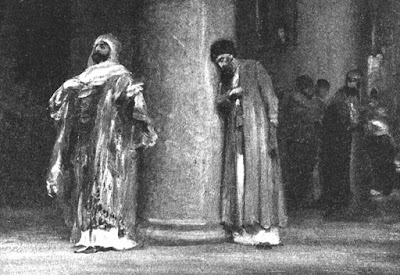Reading (Wisdom 11:22-12:2)
Before the LORD the whole universe is as a grain from a balance
or a drop of morning dew come down upon the earth.
But you have mercy on all, because you can do all things;
and you overlook people's sins that they may repent.
For you love all things that are
and loathe nothing that you have made;
for what you hated, you would not have fashioned.
And how could a thing remain, unless you willed it;
or be preserved, had it not been called forth by you?
But you spare all things, because they are yours,
O LORD and lover of souls,
for your imperishable spirit is in all things!
Therefore you rebuke offenders little by little,
warn them and remind them of the sins they are committing,
that they may abandon their wickedness and believe in you, O LORD!
Second Reading (2 Thessalonians 1:11-2:2)
Brothers and sisters:
We always pray for you,
that our God may make you worthy of his calling
and powerfully bring to fulfillment every good purpose
and every effort of faith,
that the name of our Lord Jesus may be glorified in you,
and you in him,
in accord with the grace of our God and Lord Jesus Christ.
We ask you, brothers and sisters,
with regard to the coming of our Lord Jesus Christ
and our assembling with him,
not to be shaken out of your minds suddenly, or to be alarmed
either by a "spirit," or by an oral statement,
or by a letter allegedly from us
to the effect that the day of the Lord is at hand.
Gospel (Luke 19:1-10)
At that time, Jesus came to Jericho and intended to pass through the town.
Now a man there named Zacchaeus,
who was a chief tax collector and also a wealthy man,
was seeking to see who Jesus was;
but he could not see him because of the crowd,
for he was short in stature.
So he ran ahead and climbed a sycamore tree in order to see Jesus,
who was about to pass that way.
When he reached the place, Jesus looked up and said,
"Zacchaeus, come down quickly,
for today I must stay at your house."
And he came down quickly and received him with joy.
When they all saw this, they began to grumble, saying,
"He has gone to stay at the house of a sinner."
But Zacchaeus stood there and said to the Lord,
"Behold, half of my possessions, Lord, I shall give to the poor,
and if I have extorted anything from anyone
I shall repay it four times over."
And Jesus said to him,
"Today salvation has come to this house
because this man too is a descendant of Abraham.
For the Son of Man has come to seek
and to save what was lost."
Asking the big questions: Is there anything that stuck out to you from this Gospel reading? What does the story of Zacchaeus tell us? Why did people so quickly judge Zacchaeus? How can we pursue the Lord more in our lives?







